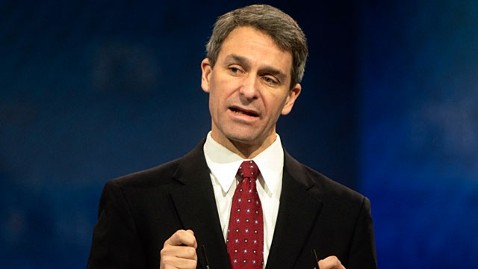In Supreme Court Brief, Ken Cuccinelli Warned Of A Slippery Slope From Gay Marriage To Polygamy

Credit: Marvin Joseph/The Washington Post/Getty Images
ABC News' Michael Falcone reports:
Virginia gubernatorial candidate Ken Cuccinelli's opposition to gay marriage is well established.
But as the U.S. Supreme Court prepares to issue decisions on two major gay marriage cases this week, less well-known is his co-authorship, in January 2013, of a court brief that laid out an argument against the constitutionality of allowing same-sex couples to marry.
In the amicus brief, Cuccinelli, the attorney general of Virginia, and Greg Zoeller, the attorney general or Indiana, used a novel justification to make their point in one section of the 55-page brief - namely that gay marriage could lead to polygamy.
"Responsible parenting is not a justification for same-sex-couple marriage, as distinguished from recognition of any other human relationships. It is instead a rationale for eliminating marriage as government recognition of a limited set of relationships. Once the natural limits that inhere in the relationship between a man and a woman can no longer sustain the definition of marriage, the conclusion that follows is that any grouping of adults would have an equal claim to marriage. See, e.g. , Jonathan Turley, One Big, Happy Polygamous Family , NY Times, July 21, 2011, at A27 ("[Polygamists] want to be allowed to create a loving family according to the values of their faith.")."
The article that Cuccinelli and Zoeller cite is a July 2011 Op-Ed in The New York Times authored by Jonathan Turley, a law professor at The George Washington University Law School, which argues that polygamy should be decriminalized.
It was just one of several citations the two attorneys general used in their brief submitted to the U.S. Supreme Court in the landmark case, Hollingsworth v. Perry, which arrived at the high court after a panel of judges in the Ninth Circuit determined that California's Proposition 8, the controversial ballot initiative that banned gay marriage in the state, was unconstitutional.
Cuccinelli and Zoeller deployed the slippery-slope warning in a section of the document that outlines arguments why "there is no coherent reason for government to recognize same-sex marriages."
"Because any interest in same-sex couples bears no link to any characteristic innately limited to them, it contains no limiting principle for excluding other groupings of individuals," the brief states.
"Virginians voted overwhelmingly to change their constitution to define marriage as only between one man and one woman. The Supreme Court's decision in the California case could have implications for all states with such marriage amendments," the Cuccinelli campaign's press secretary Anna Nix said in a statement. "As it's the attorney general's duty to vigorously protect Virginia's laws when they are challenged, he filed a brief with several other states in this case and used every available legal argument to defend the law and the will of the people of the commonwealth."
The amicus brief lists state attorneys general from 17 other states as "additional counsel," but Cuccinelli and Zoeller were the lead authors.
The argument about polygamy is not a new one in conservative legal circles, but Cuccinelli's opposition to gay marriage and his Democratic opponent, Terry McAuliffe's support for it, has become an issue in the governor's race.
At a recent candidate forum, however, McAuliffe did not appear confident that he could do anything about Virginia's own gay marriage ban if he were elected.
"If you look at the composure of the legislature, it's not an issue that I'm going to spend my time focusing on," McAuliffe said, according to the Washington Post. "It's not going to change during my four years as governor."